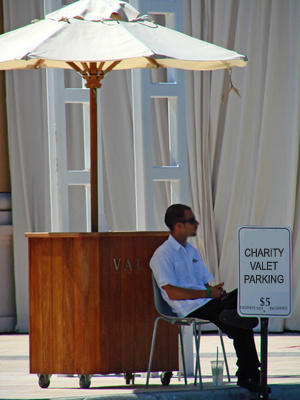|
Potential
Revenues:
|
$$$
|
|
Revenue Source:
|
Valet Parking Fees and Tips
|
|
Advertising:
|
Signage and some preliminary press releases
|
|
Equipment/Supplies:
|
Board for holding keys, claim tickets, valet
signage
|
|
Partners:
|
Area events, malls, churches, movie theaters,
restaurants |
|
Volunteers
Needed:
|
Volunteers with driver’s licenses and someone to
manage keys
|
How It Works:
Valet parking has
been around as a business for quite some time.
In contrast to "self-parking," where customers find a parking
space on their own, you will be parking their cars for them. As a charity fundraiser, you will provide the
same service as a professional valet parking service: allowing people to drop
off their cars, collecting their valet fees (donations), providing them with a
claim ticket, and then parking their cars for them. After the dinner or activity, you’ll retrieve
the vehicles and return them to the owners.
To operate this
fundraiser, you’ll need to find a busy restaurant, mall, or area event, and then
get permission for your charity to perform the valet parking service over one
or more weekends. Generally, the service
will be viewed as a plus for the restaurant, mall or special event, once you
get past the initial checks: the quality of your drivers, your ability to operate
the service, and showing proof of any permits, insurances and licenses required
to operate this type of service.
You’ll need to come
up with a way to individually identify each set of car keys with the vehicle,
the owner and the space where you parked the car. You’ll need to give the car owner a matching
identification claim check for retrieving the car. And you’ll need a large plywood board with
plenty of hooks or nails to hold the car keys.
Picking a location
will be the next challenge. We’re all
used to seeing valet parking in busy urban locations, where parking is pretty
scarce or very restricted. This might be
a bit challenging for a group inexperienced with valet parking. Maybe a venue where there is parking on the
premises is a better choice for the first go-around.
Make sure you lock the vehicles and hide any devices
that are theft-magnets, like portable GPS systems. If possible, have a volunteer permanently stationed
by the parked cars, and equip them with a cell phone or walkie-talkie. And
there should also be a volunteer stationed permanently with the car keys, to
ensure they’re safe.
Ideas to Consider:
Some of the more
unusual places to consider include hospitals (during visiting hours), movie
theaters, churches, fairs, special events, and main entrances of malls –
especially during the holiday season.
Ask the owners or operators if you can cordon off a section of their
parking area or structure for your use.
Ideally, you want drop-offs and pick-ups to be staggered, unless you’re
providing coffee and donuts to a line of church or theater goers who are
waiting on their cars to be returned.
Think about how you
can speed the retrieval of the vehicles.
If you’re working with a restaurant, suggest that the customer give the
waiter the claim ticket number when they pay the bill. In turn, ask the wait staff to notify
you. If you’re servicing the main
entrance to a mall, then give the customer a cell phone number to call, and
suggest when they should make the call to give you time to retrieve their car.
Consider leaving a brochure, gift or donation envelope
in each car that explains your mission and your appreciation for their
participation. Generally, it will be the
convenience of your service, more than your cause that will get the customers. But never underestimate the connection of a
health charity with a hospital, or a pet rescue program with an animal
show. Patrons of one are likely to be
sympathetic supporters of a related cause.
Source
of Idea: The author could not find any
examples or identify a source to credit.
Back to Home Page
|

